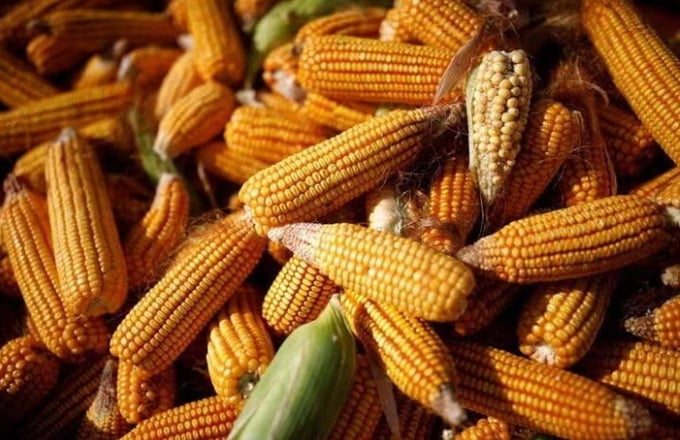May 20, 2025 | 07:04 GMT +7
May 20, 2025 | 07:04 GMT +7
Hotline: 0913.378.918
May 20, 2025 | 07:04 GMT +7
Hotline: 0913.378.918

Corn is piled in the back of a vehicle in a field on the outskirts of Jiayuguan, Gansu province, China September 28, 2020.
The agriculture ministry approved the domestic production of six more varieties of genetically modified corn, two of soybeans and one of cotton, and another two of gene-edited soybeans, a notice on the ministry's website said.
The planting zones for most of the varieties were expanded from "ecologically suitable" areas to the whole country, according to the notice. Previously, some corn varieties were restricted to the Northern or Southern producing areas.
For imports, the ministry approved gene-modified insect- and herbicide-resistant soybean variety, DBN8002, developed by Beijing Dabeinong Technology Group Co Ltd (002385.SZ), opens new tab, which had been licensed for planting in Argentina since 2022.
China also approved a Corteva Inc (CTVA.N), opens new tab herbicide-tolerant corn variety DP202216.
The new approvals extend for five years, effective from Jan. 2, 2024.
As the world's largest importer of soybeans and corn, which GM varieties China approves can have huge implications on the planting size beyond its borders, Even Pay, agriculture analyst at Trivium China, said. "Farmers don't want to plant varieties if China can't buy them."
With Chinese firms now allowed to develop and sell GM seeds, it is likely that Beijing will be a lot more forthcoming with import approvals, making GM seeds more attractive and creating a significant advantage for Chinese seed companies overseas, Pay said.
China, the world's second largest corn grower, has moved cautiously on deployment of technology for genetically modified organisms (GMO), but is steadily opening up to the cultivation of GMO crops.
In December, China issued licences for a first batch of 26 companies to breed and sell GM corn and soybean seeds domestically after years of pilot testing.
"We can expect the scope of planting to increase over the next few years and eventually become very significant," Pay said.
For now, these crops have yet to enter the industrialization phase as it still needs to go through variety validation, production, operation and other processes which involves government licenses, Zhejiang Xinan Chemical Industrial Group Co Ltd (600596.SS), opens new tab, which received approvals for four varieties, said in a stock filing.
Market penetration of gene-modified crops could reach 85% in three to five years once the industry is fully commercialised, GMO developer Beijing Dabeinong Technology (002385.SZ), opens new tab said in a filing this month.
China is pushing for higher domestic crop yields this year to ensure food security and wants to reduce its reliance on soybean and grain imports, now at more than 100 million tonnes a year.
(Reuters)

(VAN) Fourth most important food crop in peril as Latin America and Caribbean suffer from slow-onset climate disaster.

(VAN) Shifting market dynamics and the noise around new legislation has propelled Trouw Nutrition’s research around early life nutrition in poultry. Today, it continues to be a key area of research.

(VAN) India is concerned about its food security and the livelihoods of its farmers if more US food imports are allowed.

(VAN) FAO's Director-General emphasises the need to work together to transform agrifood systems.

(VAN) Europe is facing its worst outbreak of foot-and-mouth since the start of the century.

(VAN) The central authorities, in early April, released a 10-year plan for rural vitalization.

(VAN) Viterra marked a significant milestone in its carbon measurement program in Argentina, called Ígaris, reaching 1 million soybean hectares measured.